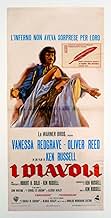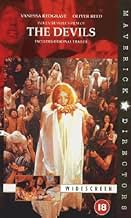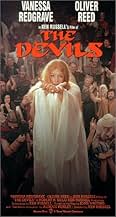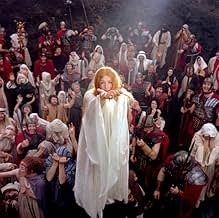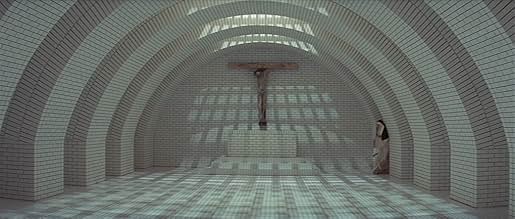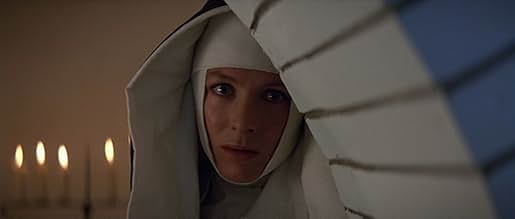Im Frankreich des 17. Jahrhunderts versucht Pater Urbain Grandier, die Stadt Loudun vor der korrupten Gründung von Kardinal Richelieu zu schützen. Hysterie tritt in der Stadt auf, wenn er vo... Alles lesenIm Frankreich des 17. Jahrhunderts versucht Pater Urbain Grandier, die Stadt Loudun vor der korrupten Gründung von Kardinal Richelieu zu schützen. Hysterie tritt in der Stadt auf, wenn er von einer sexuell unterdrückten Nonne der Hexerei beschuldigt wird.Im Frankreich des 17. Jahrhunderts versucht Pater Urbain Grandier, die Stadt Loudun vor der korrupten Gründung von Kardinal Richelieu zu schützen. Hysterie tritt in der Stadt auf, wenn er von einer sexuell unterdrückten Nonne der Hexerei beschuldigt wird.
- Regie
- Drehbuch
- Hauptbesetzung
- Auszeichnungen
- 4 wins total
Izabella Telezynska
- Sister Iza
- (as Iza Teller)
Tony Allen
- Spectator
- (Nicht genannt)
Empfohlene Bewertungen
A few movies are so controversial that the Movie industry does their best to kill them off (see Terry Gilliams' "Brazil"). Such was the case with "The Devils" First, to clear a few things up...this did NOT come from a play, nor was it a novel. It is based on Aldous Huxley's painstakingly researched religious history of the famous Loudun exorcisms during the time of Richelieu. The book may be out of print, but my wife found a copy published in 1952 by Chatto & Windus. There are some more recent publications, but this one is lovely, with an engraving of Bishop Urban Grandier(the main character) dating back to 1627. Huxley actually includes original letters, which still exist, written by the participants of this travesty. Much of the dialogue of the film is directly from Huxley. The vision however is uniquely Russell's. When this movie was originally released, it was given an X rating, not due to sex, or even violence, although there is some of each. The plain fact is that the film in its original form is simply overpowering. The Movie Review board thought so! I was fortunate enough to see the original uncut version, rated X at the local art-house upon its release. This film is a shortened version. While still worthwhile, this film absolutely SCREAMS for a Criterion Collection restoration to its original (brilliant) form.
I can't believe that someone still hasn't released a definitive version of this film on Blu Ray. I used to work in a video store and the copy we had was cut up so badly that the plot was incomprehensible. I own a DVD that seems to probably be uncut but the picture is faded and the colors aren't very bright. Also, the sound pretty bad. However, as far as I know it's the only uncut version out there. Hell, The Criterion Collection released Salo and that's miles more depraved and offensive (watch it though) than this film. I was raised Catholic and the whole film is blasphemous. When I first read Marquis de Sade's The 120 Days of Sodom (I almost couldn't finish it), the book on which Salo is based, I said to myself alot that I was going to go to Hell for reading this. The Devils gave me the same feeling. I haven't been a practicing Catholic for 45 years but those teachings are still ingrained in your subconscious. Visually, this is an absolutely beautiful film. The stark black and white colors of Loudoun and the Abby have never been duplicated as far as I know. The scene where the hysterical nuns simulate sex with Jesus on a giant cross are a bit much. It brought back the I'm going to hell for watching this. The violence in parts is still shocking even though it's 50 years old. The only flaw is Ken Russell's insistence of putting corny, un funny humor in his films. If there was ever a film that didn't need any humor it's this one. It's here though and it detracts from the flow of the film for no good reason. That's a small quibble though since the film is pretty much a masterpiece. The performances are flawless. It's Oliver Reed's best performance and Vanessa Redgrave is unforgettable as the deranged Sister Jeanne (I hope that's how it's spelled). In fact everyone is absolutely top shelf (except maybe the guy who plays the king and brings the awful humor to the movie). So, Criterion please release a version of this. Everyone else watch it without a doubt unless you hate violence, depravity and general unpleasantness. If you're a practicing Christian (especially Catholic) skip it too unless you want that I'm going to Hell feeling . Ken Russell's best film and one of the best films of all time. Watch it!
When reading the following review, please keep in mind that I saw this film in slightly unorthodox circumstances. Without meaning to sound smug, the screening I attended took place at my University, was chaired by Ken Russell and was of a restored version of The Devils. The missing footage found by the critic Mark Kermode had been spliced back in and the film restored to the director's vision as close as possible. Given that I've never seen the original edit released to cinemas back in the 1970s and that this was only the second time this version had been screened, I think its fair to estimate that the film I'm reviewing will be significantly different to the one that is widely available so please keep that in mind.
Anyway...starting with a bizarre sequence involving an androgynous, foppish King prancing around a theatre stage done up like an Egyptian Queen, Ken Russell's The Devils is a film that over the course of its subsequent hour and forty minutes is liable to offend as many people as it will entertain. The extravagance of the Royal French Court filled with laughing nobles and brown nosing politicians resplendent in the very finest dark ages fashion is soon juxtaposed when the film turns a stark gaze on a rotting countryside filled with pestilence and disease. Maggot infested corpses line the road and the attention is quickly turned on the town of Loudun, where Priest Father Grandier battles not only the plague, but the political schemers who want to demolish the walls. Grandier is such a charismatic public figure however that the politicians are powerless, until they elaborate a plan to have him tarnished with accusations of blasphemy.
Central to this conspiracy is a chapter of Nuns living near by, of whom the hunched Sister Jeanne proves instrumental. Scared of her own sexual desires, the woman is driven mad by her very human nature and soon, the inquisition are knocking on her door and every woman in the building is being tortured and brain washed in the name of Christianity. The evils of religious fanaticism are plain to see, with Michael Gothard's scene stealing extremist Father Barre being the most disgusting example of a Priest you are ever likely to see on film. He batters and humiliates women for the sake of getting his own way and is so inflexible that he will send people to their deaths rather than admit his own fallibility. Controversial scenes abound as Barre's determination brings about nothing but misery, with the brainwashed nuns stripping off and indulging in a mass orgy, culminating in perhaps the most offensive scene when a statue of Christ is pulled down from the chapel walls and used by the nuns as a sexual play thing.
While it may depict blasphemy though, the film itself is not blasphemous and believe it or not, actually celebrates Christianity. It does so through the figure of Grandier (Oliver Reed at his very best), a man whose faith in God is so strong that he will not allow the misled elders of the Church deviate him from his path. He isn't a perfect man and has a weakness for the fairer sex, but he will not bow down to pressure or allow physical pain to weaken his love of God, he is a fine depiction of a Priest of which the Church can be proud.
However, religious sermonising isn't the chief attraction because let's face it, the reason most of us would want to see this movie is because it's controversial. With the aforementioned cavorting on the cross and nun orgies it's not hard to see why and the Inquisition don't exactly come off particularly well either as they stride around the countryside, bullying and torturing and ultimately teaching their flock to hate, not to love. Furthermore, The Devils is possessed (pun very much intended) by a ceaseless, madcap energy that is easy to get swept up in and over the course of the film, you will witness flagellation, nun on nun lesbian action, deranged inquisitors chanting "confess" as they beat people with hammers and (perhaps most bizarrely of all), Oliver Reed duelling with a man using a stuffed crocodile in place of a sword.
Yes, it is a bit uneasy to watch sometimes. Yes, at times it does resemble little more than visual extremity taken to the limit and no its not likely to find it's way into the Pope's DVD collection any time soon. The underlying message is ultimately a pure one though and it has the added benefit of being one of the most insane films you're ever likely to see, as well as making you glad you don't live in the middle ages. If you ever get a chance to see the restored version I couldn't recommend it higher.
Anyway...starting with a bizarre sequence involving an androgynous, foppish King prancing around a theatre stage done up like an Egyptian Queen, Ken Russell's The Devils is a film that over the course of its subsequent hour and forty minutes is liable to offend as many people as it will entertain. The extravagance of the Royal French Court filled with laughing nobles and brown nosing politicians resplendent in the very finest dark ages fashion is soon juxtaposed when the film turns a stark gaze on a rotting countryside filled with pestilence and disease. Maggot infested corpses line the road and the attention is quickly turned on the town of Loudun, where Priest Father Grandier battles not only the plague, but the political schemers who want to demolish the walls. Grandier is such a charismatic public figure however that the politicians are powerless, until they elaborate a plan to have him tarnished with accusations of blasphemy.
Central to this conspiracy is a chapter of Nuns living near by, of whom the hunched Sister Jeanne proves instrumental. Scared of her own sexual desires, the woman is driven mad by her very human nature and soon, the inquisition are knocking on her door and every woman in the building is being tortured and brain washed in the name of Christianity. The evils of religious fanaticism are plain to see, with Michael Gothard's scene stealing extremist Father Barre being the most disgusting example of a Priest you are ever likely to see on film. He batters and humiliates women for the sake of getting his own way and is so inflexible that he will send people to their deaths rather than admit his own fallibility. Controversial scenes abound as Barre's determination brings about nothing but misery, with the brainwashed nuns stripping off and indulging in a mass orgy, culminating in perhaps the most offensive scene when a statue of Christ is pulled down from the chapel walls and used by the nuns as a sexual play thing.
While it may depict blasphemy though, the film itself is not blasphemous and believe it or not, actually celebrates Christianity. It does so through the figure of Grandier (Oliver Reed at his very best), a man whose faith in God is so strong that he will not allow the misled elders of the Church deviate him from his path. He isn't a perfect man and has a weakness for the fairer sex, but he will not bow down to pressure or allow physical pain to weaken his love of God, he is a fine depiction of a Priest of which the Church can be proud.
However, religious sermonising isn't the chief attraction because let's face it, the reason most of us would want to see this movie is because it's controversial. With the aforementioned cavorting on the cross and nun orgies it's not hard to see why and the Inquisition don't exactly come off particularly well either as they stride around the countryside, bullying and torturing and ultimately teaching their flock to hate, not to love. Furthermore, The Devils is possessed (pun very much intended) by a ceaseless, madcap energy that is easy to get swept up in and over the course of the film, you will witness flagellation, nun on nun lesbian action, deranged inquisitors chanting "confess" as they beat people with hammers and (perhaps most bizarrely of all), Oliver Reed duelling with a man using a stuffed crocodile in place of a sword.
Yes, it is a bit uneasy to watch sometimes. Yes, at times it does resemble little more than visual extremity taken to the limit and no its not likely to find it's way into the Pope's DVD collection any time soon. The underlying message is ultimately a pure one though and it has the added benefit of being one of the most insane films you're ever likely to see, as well as making you glad you don't live in the middle ages. If you ever get a chance to see the restored version I couldn't recommend it higher.
I can never understand why "The Devils", which was such a major film and caused such controversy, never became a cult classic being shown every other week on cable TV. This film totally annihilates all the trashy "straight-to-video" horror films. Based on true events in 17th century France, this film is one of the most horrifying tales of man's intolerance: religious and sexual.
The tale begins with an outbreak of the plague, which the folk of the middle ages, with typical misunderstanding of the real cause, rat fleas, believed that someone was to blame. Who more convenient a scapegoat than Father Grandier, played by the notorious Oliver Reed an actor who ended his rambunctious life by dropping dead in a bar. The sexual appeal of Fr. Grandier drives the supposedly celibate clergy into a frenzy of jealousy. A group of nuns, led by a noblewoman who has been forced into the convent due to her physical deformity and therefore, lack of marriageable options, joins in the hysteria which is not satisfied until Fr. Grandier is burned at the stake.
Although set in France in the middle ages, a lot of the hysteria can be seen today, in our more enlightened times. Just witness the periodic witch hunts in the United States, such as the furore over the alleged Satanic cults running day care centers, not to mention the reds under the beds hysteria of the 50's.
This was one of Ken Russell's most controversial films, and definitely very 70's in its style, after all, we had Mick Jagger and Twiggy perfectly cast as decadent French nobility, and it has taken 20+ years to see how right on the mark he was.
Although Russell was the hottest thing in cinema for a while, he faded like a discarded fashion as every wannabe copied his style, but without being able to understand what is was that set Ken Russell apart. Unfortunately Russell did not help his reputation by becoming more and more the icon of bad taste. Eventually he became a parody and the fickle who had formally worshipped his genius could not disassociate themselves quickly enough.
Like Orson Welles, Ken Russell's brilliance will not be realized until a new generation discovers his work. I recommend "The Devils" along with "The Music Lovers" as his best work.
The tale begins with an outbreak of the plague, which the folk of the middle ages, with typical misunderstanding of the real cause, rat fleas, believed that someone was to blame. Who more convenient a scapegoat than Father Grandier, played by the notorious Oliver Reed an actor who ended his rambunctious life by dropping dead in a bar. The sexual appeal of Fr. Grandier drives the supposedly celibate clergy into a frenzy of jealousy. A group of nuns, led by a noblewoman who has been forced into the convent due to her physical deformity and therefore, lack of marriageable options, joins in the hysteria which is not satisfied until Fr. Grandier is burned at the stake.
Although set in France in the middle ages, a lot of the hysteria can be seen today, in our more enlightened times. Just witness the periodic witch hunts in the United States, such as the furore over the alleged Satanic cults running day care centers, not to mention the reds under the beds hysteria of the 50's.
This was one of Ken Russell's most controversial films, and definitely very 70's in its style, after all, we had Mick Jagger and Twiggy perfectly cast as decadent French nobility, and it has taken 20+ years to see how right on the mark he was.
Although Russell was the hottest thing in cinema for a while, he faded like a discarded fashion as every wannabe copied his style, but without being able to understand what is was that set Ken Russell apart. Unfortunately Russell did not help his reputation by becoming more and more the icon of bad taste. Eventually he became a parody and the fickle who had formally worshipped his genius could not disassociate themselves quickly enough.
Like Orson Welles, Ken Russell's brilliance will not be realized until a new generation discovers his work. I recommend "The Devils" along with "The Music Lovers" as his best work.
10degelb
Cited by director Alex Cox and critic Mark Kermode as one of the ten greatest achievements in cinema of all time, The Devils is based on a true story set in France in 1634 about the evils of the union of church and state controlled by power hungry, perverse men who prey on faith and fear, and one priest, Father Grandier, who tries to protect the liberties and walls of his city, Loudun.
This film was met with great controversy and opposition due to its contents and depictions of blasphemy. Hardly available today, the current VHS release suffers from trigger happy censors with no desire to leave the plot intact. The video translation is appalling, with only a fraction of the resolution and quality of film, and the fullscreen framing mauls at least 60% of the compositions. If you can attain this on widescreen on DVD, you are a lucky person. Unfortunately, as is reflected by another comment on this board, most people see the crappy version and judge the film based on that.
This film was met with great controversy and opposition due to its contents and depictions of blasphemy. Hardly available today, the current VHS release suffers from trigger happy censors with no desire to leave the plot intact. The video translation is appalling, with only a fraction of the resolution and quality of film, and the fullscreen framing mauls at least 60% of the compositions. If you can attain this on widescreen on DVD, you are a lucky person. Unfortunately, as is reflected by another comment on this board, most people see the crappy version and judge the film based on that.
Wusstest du schon
- WissenswertesDerek Jarman's sets are modeled on the sets of Fritz Lang's Metropolis (1927). Ken Russell wanted to avoid the clichéd look of period films and insisted on anachronistic, even futuristic, design. Russell's guidance to Jarman was that it should echo the 'rape in a public toilet' line from the Huxley novel that inspired the film.
- PatzerEarly in the movie when Urbain Grandier (Oliver Reed) is seen grooming his hair. It is a close-up of him supposedly looking at a mirror in the upper left hand corner of the screen, behind the viewer. Obviously there is no mirror as he consistently misses combing the more egregiously messed up parts of his hair and instead repeatedly combs the portions that are already groomed. In fact when he is done, his hair is still messed up.
- Crazy CreditsAt the start of the film: "This film is based upon historical fact. The principal characters lived and the major events in the film actually took place."
- Alternative VersionenIn 2012 the BFI persuaded Warners to allow them to release the film on video in the UK. Warners refused to allow the director's cut at all and would only allow the BFI to release the original 'X' certificate version on DVD. Warners refused permission to allow a hi rez release. The BFI produced a superb DVD transfer for the first time in its proper 2.35:1 ratio. The Channel 4 documentary 'Hell on Earth' was included but the 'Rape of Christ' sequence was removed. They also cut a line of dialogue when one of the actors refers to Warners as a bunch of 'c**ts'. Before this in the USA the 'unrated' version appeared as an upcoming release complete with sleeve art. 24 hours later Warners stopped the release!
- VerbindungenFeatured in Omnibus: Russell's Progress (1971)
- SoundtracksBourrée d'Avignon
from Secretum musarum (1615)
Music by Nicolas Vallet.
Played as the king's dance in the opening.
Top-Auswahl
Melde dich zum Bewerten an und greife auf die Watchlist für personalisierte Empfehlungen zu.
- How long is The Devils?Powered by Alexa
Details
- Erscheinungsdatum
- Herkunftsländer
- Sprachen
- Auch bekannt als
- Los demonios
- Drehorte
- Produktionsfirma
- Weitere beteiligte Unternehmen bei IMDbPro anzeigen
Box Office
- Weltweiter Bruttoertrag
- 2.293 $
- Laufzeit1 Stunde 51 Minuten
- Sound-Mix
- Seitenverhältnis
- 2.35 : 1
Zu dieser Seite beitragen
Bearbeitung vorschlagen oder fehlenden Inhalt hinzufügen


![Trailer [EN]](https://m.media-amazon.com/images/M/MV5BYjgxZTMwNzYtYmE4Zi00ZDNjLWJkZjUtNTQ1NGQ1ZWRmMDAwXkEyXkFqcGdeQXRyYW5zY29kZS13b3JrZmxvdw@@._V1_QL75_UX500_CR0)

